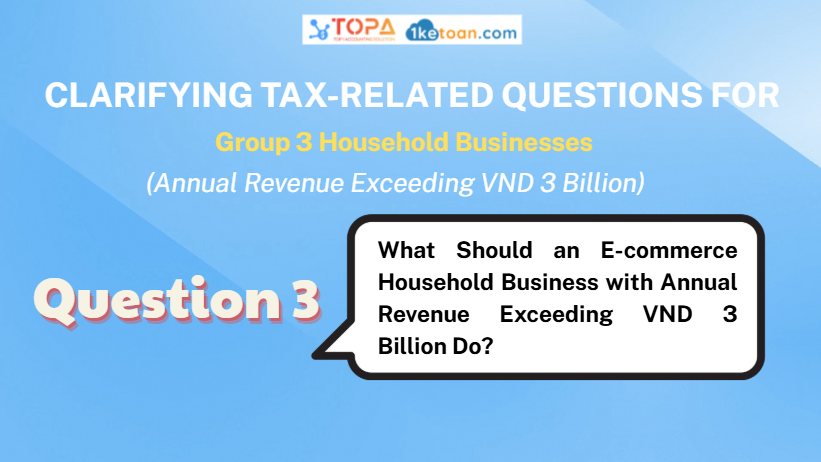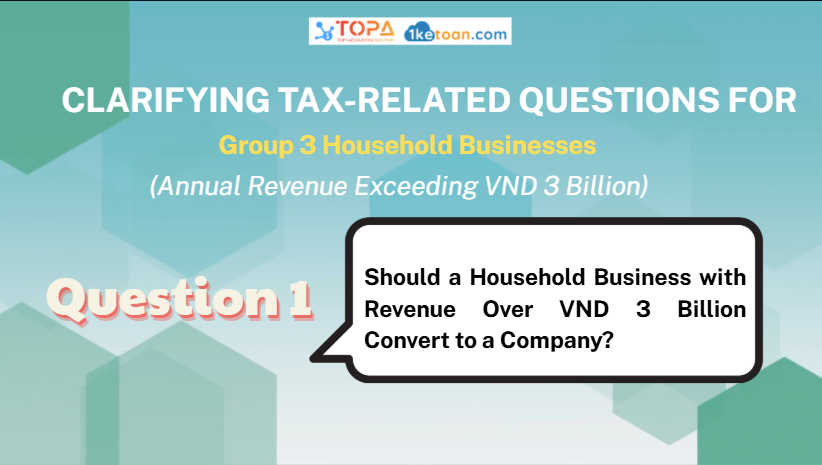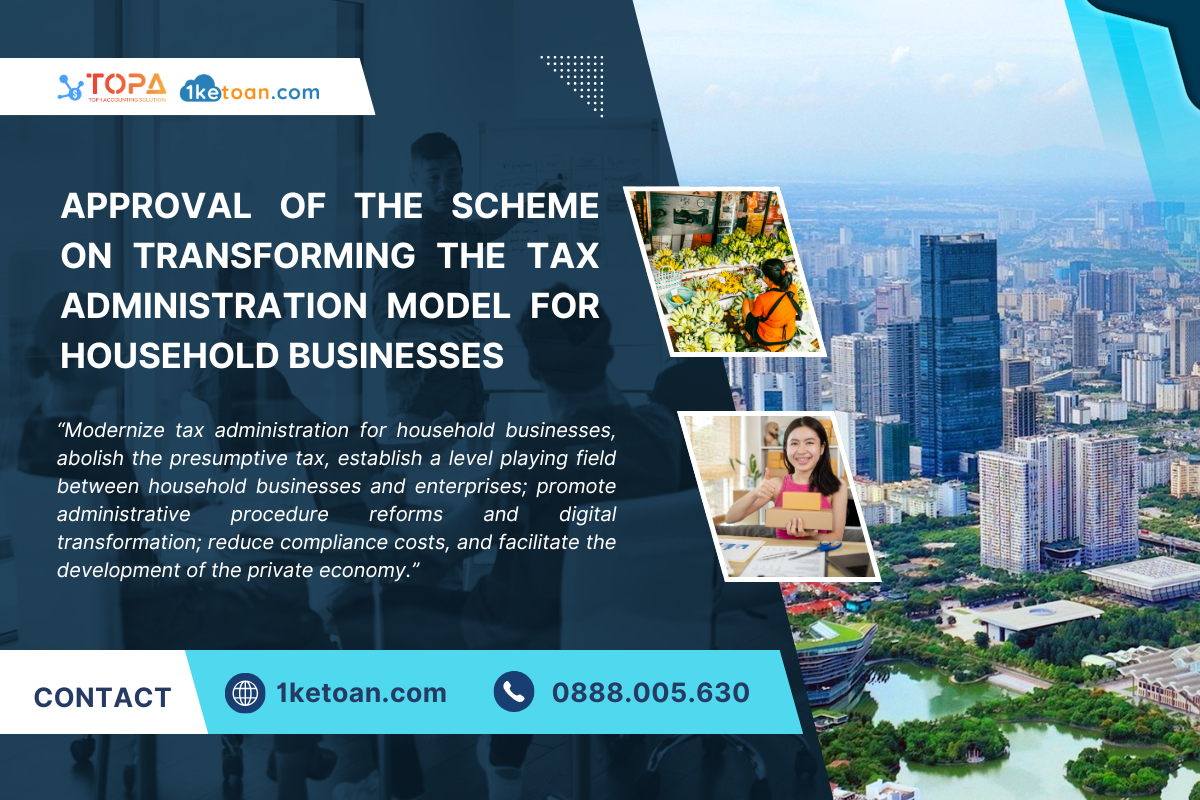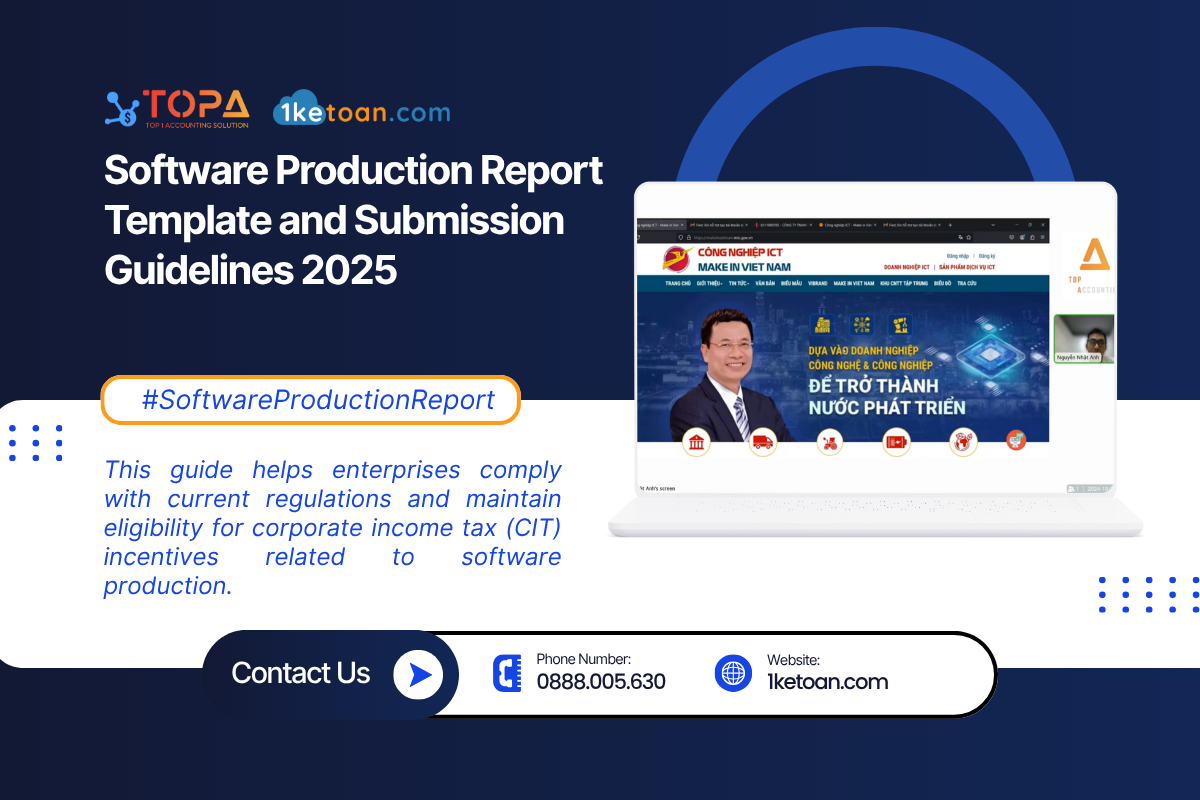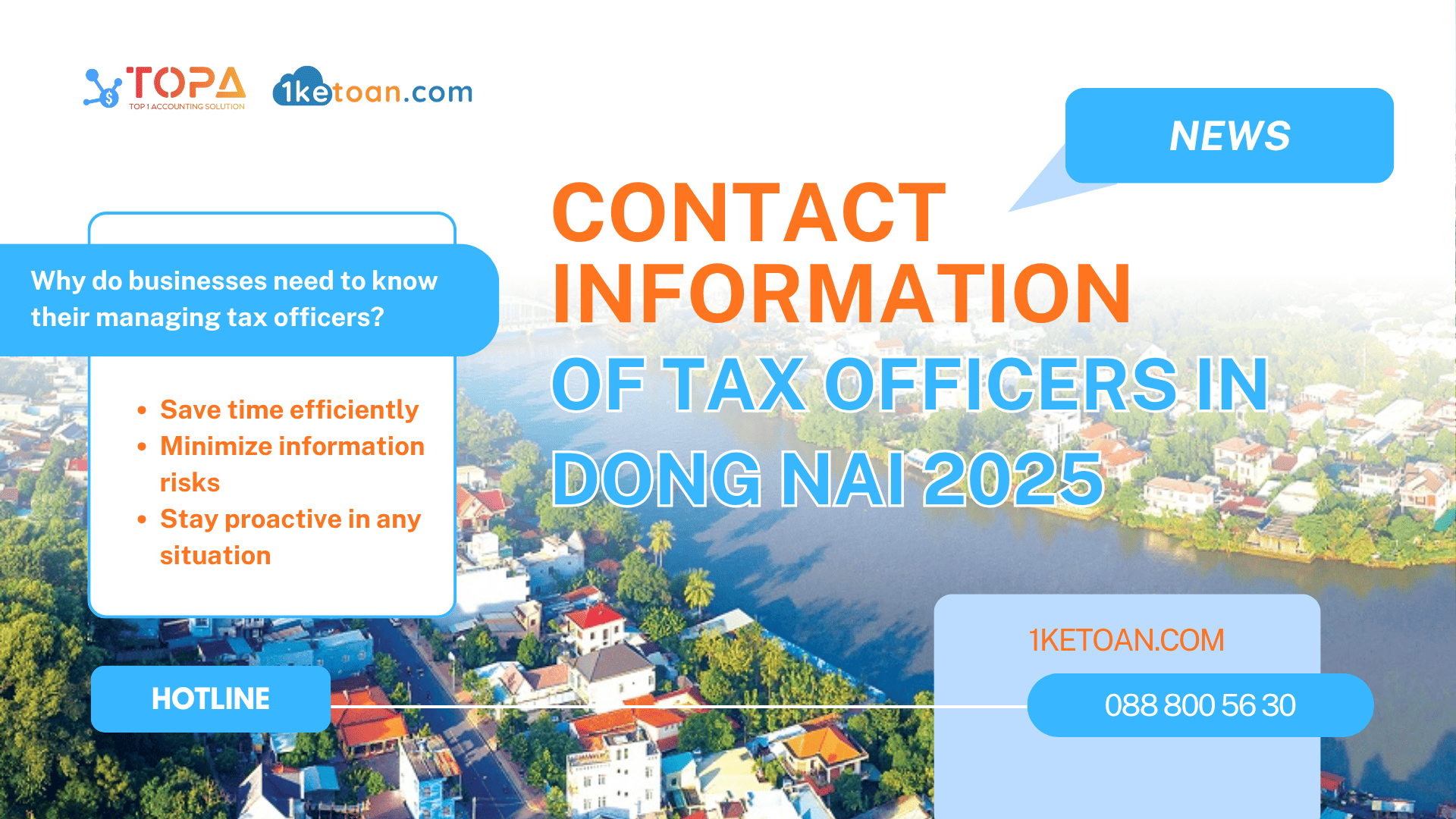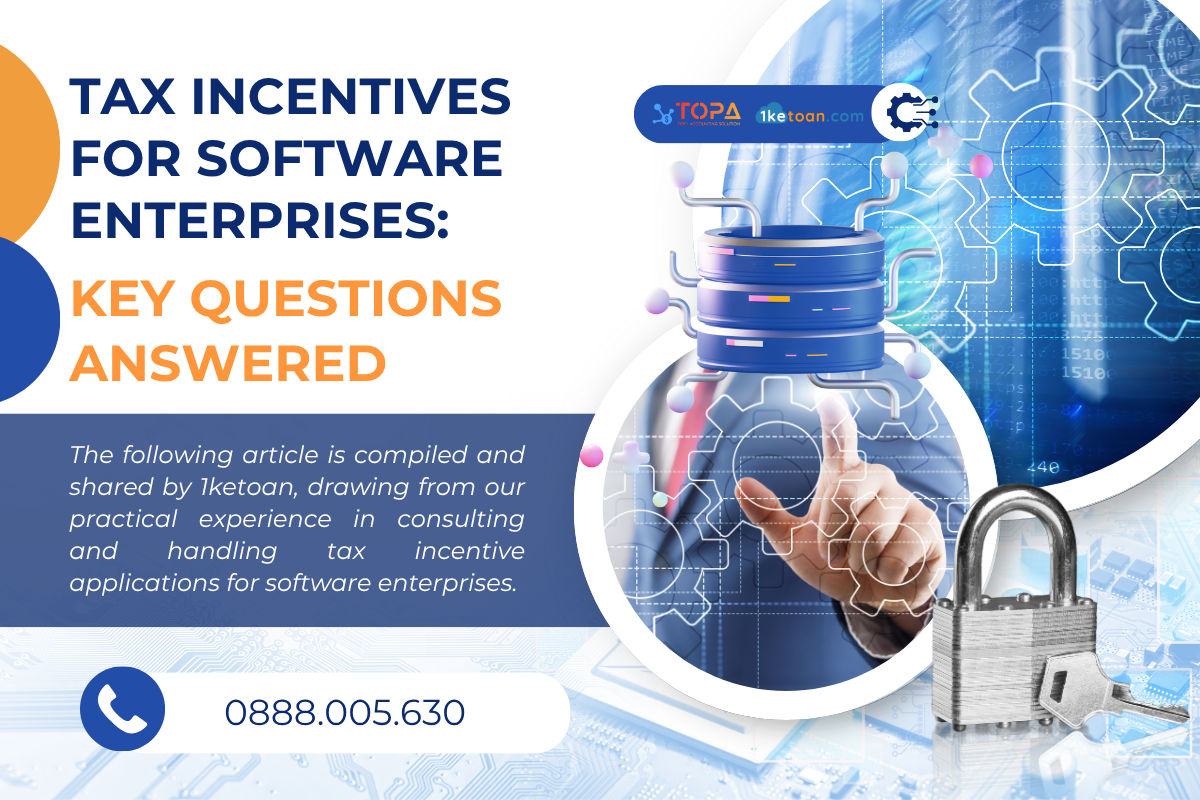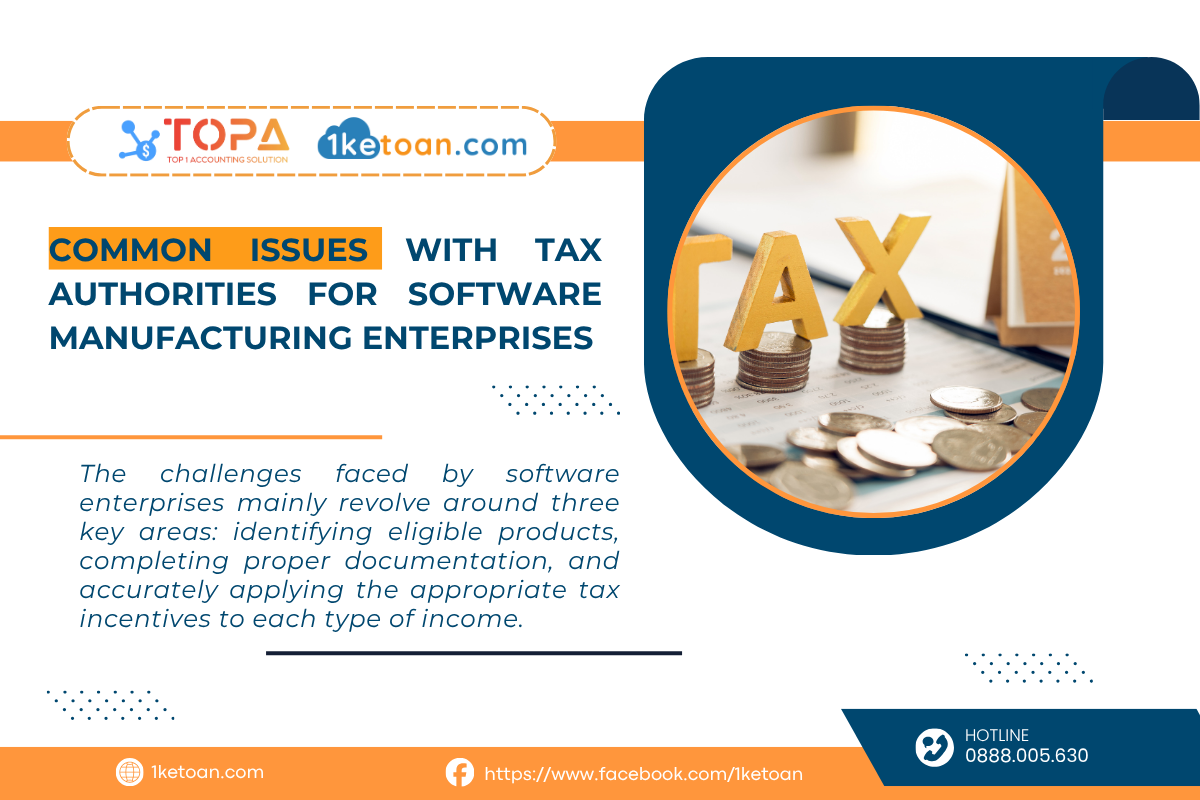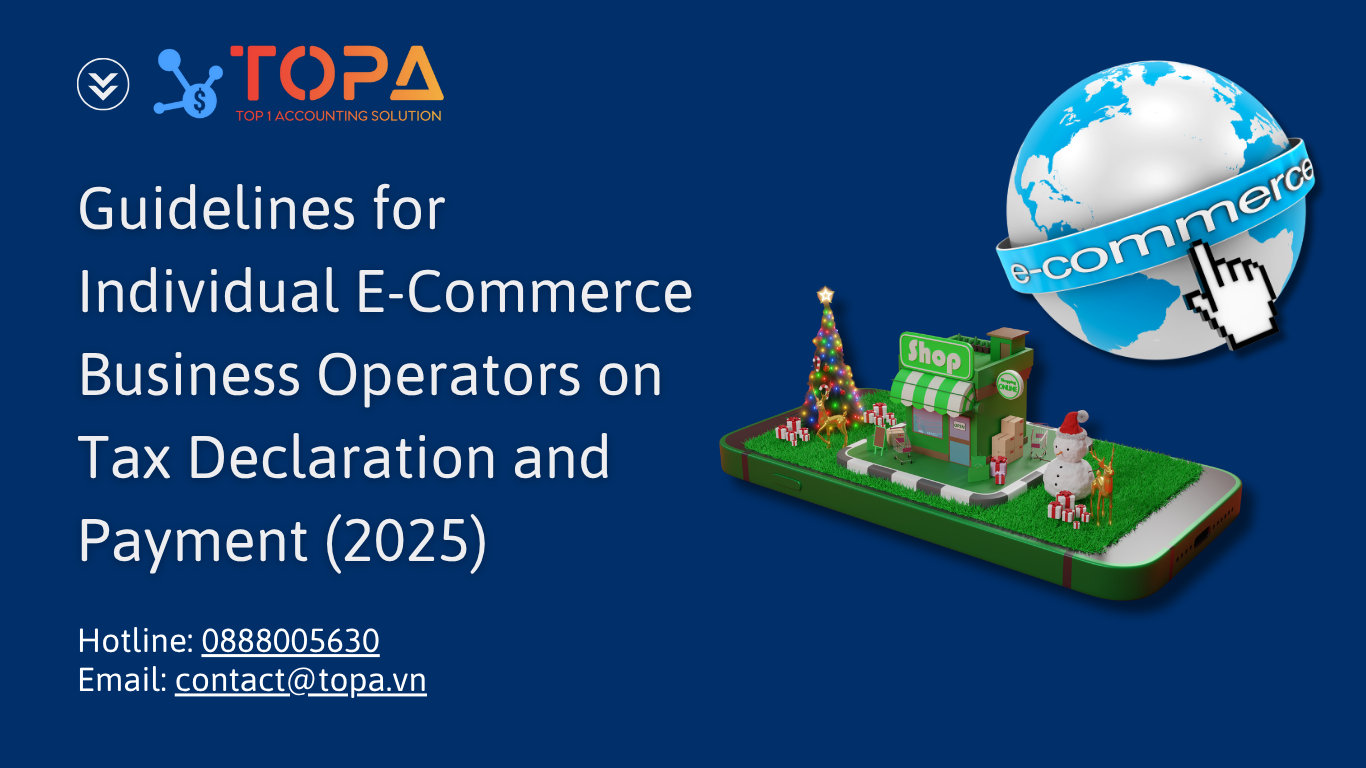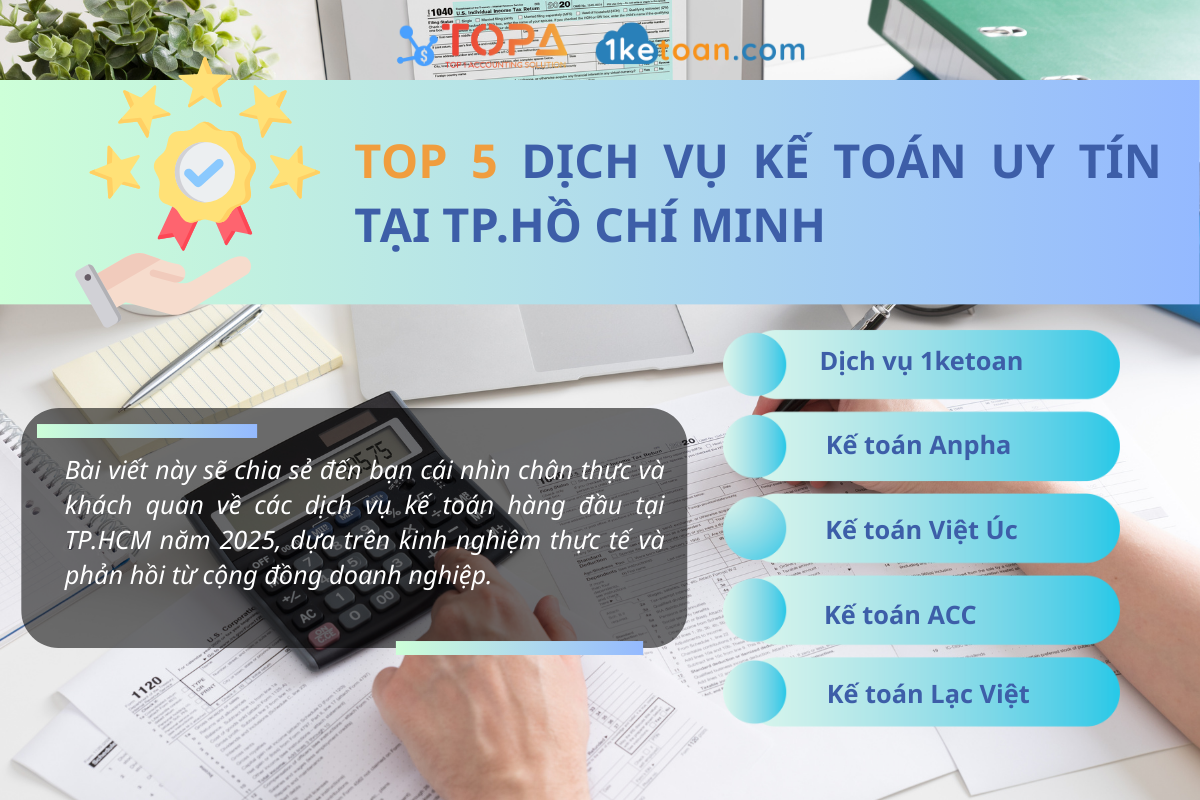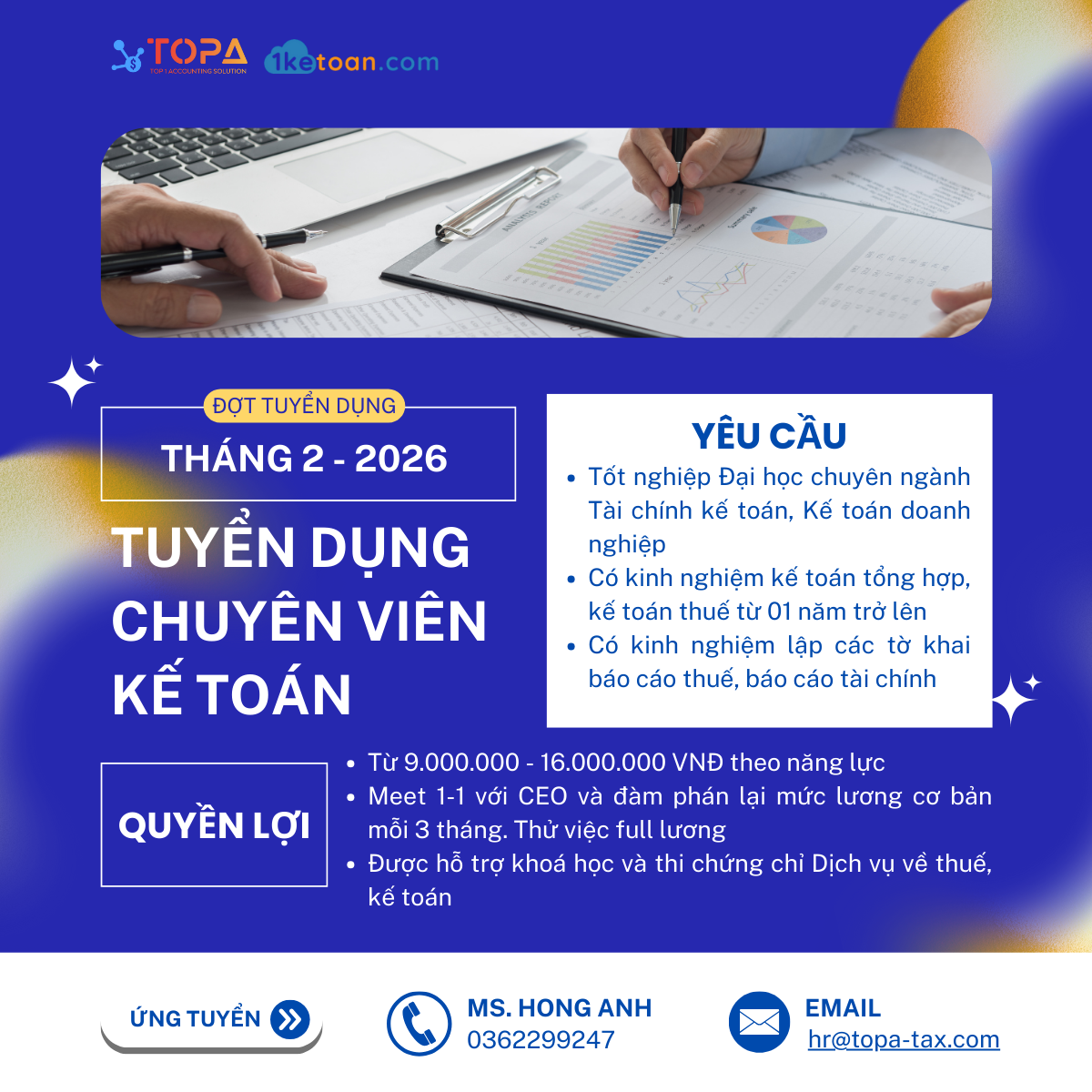Tax Incentives for Software Enterprises: Key Questions Answered
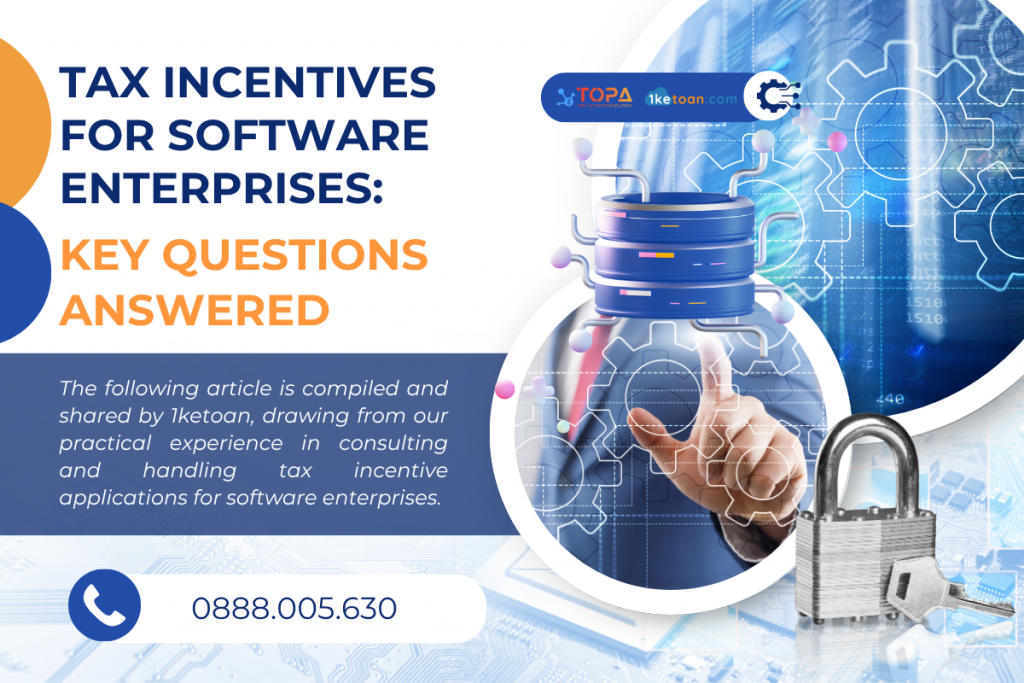
During our years of working with many technology enterprises, the 1ketoan team has observed that tax incentives for software production companies are among the most attractive government policies — yet also the most frequently misunderstood.
Many businesses assume that “as long as we make software, we qualify for incentives,” whereas in reality, the law sets out specific conditions that must be met.
The following article is compiled and shared by 1ketoan, based on our hands-on experience in consulting and handling tax incentive applications for software enterprises.
Nội dung
- 1 1. What must an enterprise do to prove it is a new investment project?
- 2 2. Can a company that previously operated in another industry receive tax incentives after shifting to software production?
- 3 3. Is confirmation from the Ministry or Department of Information and Communications required to qualify as a software production company?
- 4 4. Must an enterprise carry out the entire software production process to qualify for tax incentives?
- 5 5. Are software outsourcing companies eligible for tax incentives?
- 6 6. Reference Official Documents
- 6.1 Official Letter No. 1247/TCT-CS – High risk when enterprises self-determine CIT incentives
- 6.2 Official Letter No. 57266/CT-TTHT – Need to consult the Department of Information and Communications for confirmation?
- 6.3 Official Letter No. 42616/CT-TTHT – Tax incentives for specific business codes (only “programming” qualifies)
- 6.4 Tax incentives without an investment certificate
- 7 Conclusion: Preparing tax incentive documentation
1. What must an enterprise do to prove it is a new investment project?
According to the Law on Investment, every newly established company is considered a new investment project.
Clause 1(b), Article 15 of Decree 218/2013/NĐ-CP clearly states:
“Investment projects for software product manufacturing that are included in the list of software products and comply with the legal process for software production shall be eligible for incentives.”
In other words, as long as a company develops legitimate software products and follows the legally defined software production process, it may qualify for Corporate Income Tax (CIT) incentives.
To prove the status of a new investment project, the accounting team should prepare the following documents:
- Business registration certificate indicating the business line of “software production.”
- Software production process documentation in accordance with Circular 13/2020/TT-BTTTT.
- Evidence of actual operations, such as contracts, products, source code, production logs, etc.
For newly established companies, these conditions offer a favorable opportunity to enjoy tax incentives right from the first year of operation.
2. Can a company that previously operated in another industry receive tax incentives after shifting to software production?
Yes — if the company can prove that this is a new investment project.
According to Decree 218/2013/NĐ-CP, income generated from a new software production project is still eligible for tax incentives, even if the enterprise previously operated in a different business sector.
In practice, 1ketoan often advises clients to:
- Add an Investment Registration Certificate specifically for the new software project.
- Separate revenue, expenses, and income between the existing and new projects.
This is a crucial step to help businesses avoid the risk of having their incentives rejected by tax authorities due to insufficiently segregated documentation.
Many of our clients have successfully formalized their software projects and received full tax benefits after 1ketoan’s support in completing their investment documentation.
3. Is confirmation from the Ministry or Department of Information and Communications required to qualify as a software production company?
No, it is not required.
Under Circular 13/2020/TT-BTTTT, enterprises are responsible for self-determining and self-declaring their software production activities.
At present, the Ministry or local Department of Information and Communications does not issue any certification confirming software production status for the purpose of tax incentives.
Therefore, the tax incentive documentation must be self-prepared by the enterprise, typically including:
- Documentation describing the software production process;
- The list of software products as regulated in Decision 1491/QĐ-BTTTT;
- Evidence of actual activities, such as source code, design documents, prototypes, contracts, invoices, etc.
Based on 1ketoan’s experience in assisting numerous clients, as long as the documentation is properly structured and supported by sufficient evidence, an enterprise can independently prove its eligibility for tax incentives — without any need for official confirmation from the authorities.
4. Must an enterprise carry out the entire software production process to qualify for tax incentives?
The answer is: not necessarily.
According to Circular 13/2020/TT-BTTTT, each stage of software production may consist of “one or multiple activities.”
This means that a company does not have to complete the entire software production cycle (from requirements analysis to deployment and maintenance) to be recognized as a software producer.
As long as the enterprise performs one or more key stages in the software production chain and can demonstrate the value it creates, it still qualifies for tax incentives.
Example:
A company that handles UI design and source code development is still considered to be engaged in software production.
However, if the company only performs maintenance or user support tasks, that may not be sufficient to qualify as software production.
To minimize risks, the 1ketoan team always recommends that enterprises document a clear software production process, including flowcharts and detailed descriptions of each stage.
Doing so not only ensures transparency in the incentive documentation but also helps accountants explain and defend the process during tax audits or inspections.
5. Are software outsourcing companies eligible for tax incentives?
Yes — provided that their outsourcing activities meet the criteria for software production.
Under current regulations, software outsourcing is considered a form of software production, as long as the enterprise:
- Has a defined software production process;
- Produces outputs that fall within the official list of software products;
- Holds valid outsourcing contracts and supporting documents proving actual production activities.
Many Vietnamese enterprises currently provide software outsourcing services to partners in countries such as the U.S., Japan, and South Korea, and they fully qualify for tax incentives — as long as their documentation is properly prepared and compliant with legal requirements.
1ketoan has supported numerous companies in standardizing their documentation, classifying products and processes, and ensuring that they can enjoy tax incentives smoothly, even during tax inspections or reviews.
6. Reference Official Documents
Official Letter No. 1247/TCT-CS – High risk when enterprises self-determine CIT incentives
According to the cited regulations, newly established enterprises from investment projects in software product manufacturing are eligible for Corporate Income Tax (CIT) incentives as stated.
As mentioned in Official Letter No. 01-13/SAP dated January 21, 2013, from SAP ASIA Vietnam Co., Ltd., the company is responsible for developing Single Sign-On (SSO) management and the Graphical User Interface (GUI) to create fully packaged software products for customers, such as NetWeaver Single Sign On 2.0 and Identity Management System (IDM).
However, Official Letter No. 10890/SKHĐT-ĐKĐT dated December 19, 2012, from the Ho Chi Minh City Department of Planning and Investment (DPI) stated that software implementation services include activities related to software production. Meanwhile, Official Letter No. 26/STTTT-CNTT dated January 8, 2013, from the Ho Chi Minh City Department of Information and Communications (DIC) indicated that the company’s registered business lines include software product manufacturing.
Nevertheless, neither the DPI nor the DIC explicitly confirmed whether the software design and development services described constitute software product manufacturing. Therefore, there was insufficient basis to grant CIT incentives at that time.
The General Department of Taxation (GDT) requested the Ho Chi Minh City Tax Department to coordinate with SAP ASIA Vietnam Co., Ltd. to clarify and detail the activities described in Official Letter No. 01-13/SAP, so that the GDT could report to the Ministry of Information and Communications (MIC) and the Ministry of Planning and Investment (MPI) for further official guidance.
Official Letter No. 57266/CT-TTHT – Need to consult the Department of Information and Communications for confirmation?
- For companies established from new investment projects between January 1, 2012, and December 31, 2013, if they meet the conditions in Article 18 of Circular 123/2012/TT-BTC and are engaged in software production and supply activities consistent with their registered business lines, they are not subject to VAT and are eligible for CIT incentives under Articles 19 and 20 of the same Circular.
- For companies with income from new investment projects from January 1, 2014, onwards, if they meet the conditions in Article 18 of Circular 78/2014/TT-BTC, they are likewise not subject to VAT and enjoy CIT incentives as prescribed in Articles 19 and 20 of Circular 78/2014/TT-BTC.
- The tax authority recommends that enterprises consult the local Department of Information and Communications (e.g., Hanoi DIC) to determine whether their business activities qualify as software production under the law.
Official Letter No. 42616/CT-TTHT – Tax incentives for specific business codes (only “programming” qualifies)
According to the cited regulations:
If a newly established company operates in the following fields:
- Computer programming (CPC 842)
- Computer consultancy and system administration (CPC 8421)
- Information services and other related computer services (CPC 8499)
Then:
- Income from “Computer programming” qualifies for CIT incentives if it meets the requirements under Articles 5 and 6 of Circular 16/2014/TT-BTTTT (issued by the Ministry of Information and Communications on November 18, 2014).
- Preferential CIT rate: 10% for 15 years
- 4 years of CIT exemption, followed by 50% CIT reduction for the next 9 years
- The exemption/reduction period starts from the first year the enterprise earns taxable income from the new investment project.
- If the company has no taxable income in the first three years after generating revenue, the exemption period starts in the fourth year, as provided in Articles 11 and 12 of Circular 96/2015/TT-BTC (Ministry of Finance).
- Preferential CIT rate: 10% for 15 years
- Income from “Computer consultancy and system administration (CPC 8421)” and “Information services and other related computer services (CPC 8499)” are not recognized as software production activities and therefore not eligible for CIT incentives.
Tax incentives without an investment certificate
According to current regulations and the company’s submitted documents:
If an enterprise is established and begins operation (e.g., on July 4, 2017) with registered capital of VND 20 billion, primarily engaging in software production without obtaining an Investment Registration Certificate for the software production project, it will not be eligible for CIT incentives applicable to new investment projects as per Clause 1, Article 11 and Clause 1, Article 12 of Circular 96/2015/TT-BTC (Ministry of Finance).
Conclusion: Preparing tax incentive documentation
Tax incentives for software enterprises are among the most substantial preferential policies currently available — including 4 years of CIT exemption and a 50% tax reduction for the following 9 years.
However, the biggest risk lies not in the policy itself but in how the enterprise prepares and maintains documentation.
At 1ketoan, we believe that every software company deserves to fully enjoy its tax benefits — provided that it is properly prepared and compliant.
Our team is ready to assess your eligibility, guide you through the documentation process, and provide end-to-end support so you can confidently claim incentives that are transparent, compliant, and risk-free.
👉 Learn more about our specialized service at:
🔗 https://1ketoan.com/dich-vu-uu-dai-thue-dn-phan-mem/



